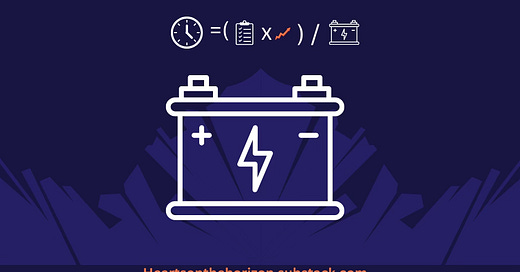Pandemic Math Part 2: The Power of Focusing on Recovery
In the essay "Pandemic Math: Calculating for Compassion and Congruence," I invited Still Coviders to try out an equation that attempts to help us make sense of the vast disparities between how time and effort feel so distorted from our pre-pandemic lives.
It goes like this:
Perceived Time (t) = Baseline Effort (b) × Exponential Complexity (e) / Recovery Factor (r)
Baseline Effort (b): The usual time a task takes under normal circumstances.
Exponential Complexity (e): A multiplier accounting for pandemic-related factors that make tasks more complex.
Recovery Factor (r): A measure of current energy and emotional reserves, ranging from 0 to 1.
This formula illustrates how tasks that once seemed straightforward now feel disproportionately demanding due to increased complexity and reduced energy/recovery levels.
The hope is that a formula like this can reassure those of us who are Still Coviding that our struggles are valid and understandable. It can help us approach our daily lives with greater self-compassion and realistic expectations.
Personal Impact
Pandemic math hasn’t transformed my life since I first wrote about it last week and solidified the equation that has been bouncing around in my mind for months. But to be fair, this week was a complex flurry of energy expenditure that included hosting two Covid -Cautious gatherings, planning and shopping for the expansion of our outdoor community play space, and lots of testing and management of guidelines for a visiting family member. To apply Pandemic Math, there was a HIGH E (exponential complexity multiplier) and a low R (Recovery Factor), and therefore, it felt like everything took FOREVER without much progress to show for it.
Even though I didn’t experience a transformation in the struggle, just the awareness helped me become more conscious of WHY and more clear about steps I can take within my constraints and without compromise to shift my experience.
Today, I became profoundly aware of the need to focus more intensely on recovery- not just because I desperately need it after this week’s events, but also because I think it aligns with the idea of changing our “blueprint” (design/vision for our lives) when we can’t change the conditions surrounding us as a way to reduce suffering (not pain as that is entirely unavoidable in life).
So, let’s dig deeper into the Recovery Factor:
What is the Recovery Factor (R) in Pandemic Math?
· Definition: The recovery factor represents the physical, mental, and emotional energy reserves available to tackle daily tasks.
· Why it matters: When R is low, even small tasks feel overwhelming, amplifying the effects of pandemic/still coviding fatigue. Strengthening R can help reduce the perceived effort and time needed for everyday life.
What Drains the Recovery Factor?
· Physical drains: Chronic stress, illness, or disrupted routines.
· Mental and emotional drains: Decision fatigue, grief, and isolation.
· Social drains: Lack of support, misunderstandings from others, and conflict.
I have engaged in several “recovery” practices throughout the pandemic without calling them that. However, categorizing them and using the label R now makes them feel more purposeful and essential. Furthermore, it gives me a checklist to identify one or two new actions I can take to strengthen my recovery, and hopefully begin to build reserves for the more trying times.
Revisiting the application of some Lazy Genius principles to our Still Coviding life, like “Essentialize,” “Decide Once,” and “Ask the Magic Question,” which I wrote about this summer, and reading her new book The Plan, are on my list as possible pathways to strengthening all the categories of “my R” (recovery factor) in the new year.
What Strengthens the Recovery Factor
1. Physical Energy
· Sleep hygiene: Prioritizing consistent rest.
· Nutrition: Foods that support sustained energy (low glycemic, nutrient-dense options).
· Movement: Gentle exercise or stretching to boost energy without overexertion.
2. Emotional Resilience
· Self-compassion: Recognizing your limits and celebrating small wins.
· Therapeutic practices: Journaling, mindfulness, or professional therapy to process emotions.
· Positive connection: Finding joy in small, safe interactions with loved ones or pets.
3. Mental Clarity
· Simplify decisions: Use routines and habits to minimize decision fatigue.
· Set boundaries: Say no to tasks or events that deplete energy.
· Create order: Organize spaces to reduce cognitive load.
4. Social Support
· Curate relationships: Prioritize time with understanding, supportive people.
· Communicate needs: Be open about what helps or harms your energy.
· Find your community: Online or local groups that align with your values.
Sometimes, no matter what our best intentions are, nor how hard we try, or even if we are Lazy Geniuses and Do ALL the things well, there will be parts of our lives that feel like setbacks—times when all the hard work we’ve been doing to recover seems to be washed away.
But the truth is, the improvement in our Recovery Factor isn’t lost—and even the storms are just part of the process. If we can approach it as such, the epically hard days can actually help us learn how to strengthen our “R” during the “regular hard” days and seasons of the still-coviding life.
How to Rebuild (R) During Setbacks:
· Rest without guilt: Recovery is essential and not indulgent.
· Reassess priorities: Focus on what’s truly necessary.
· Celebrate incremental progress: Focus on what has been achieved, however small.
Recovery Is a Process
· Emphasize the dynamic nature of R—it ebbs and flows.
· Recognize that strengthening recovery is about small, consistent actions, not perfect
· Offer encouragement: Every effort to build reserves improves the equation for pandemic life.
I would love to hear how you are using pandemic math and what you are doing to recover during this holiday/end-of-year season.
I’m considering organizing a live call/group discussion around Pandemic Math as a compassionate, congruent path to setting intentions, goals, and desires for the New Year. Let me know if you are interested in that as well.



